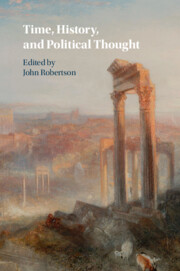Book contents
- Time, History, and Political Thought
- Time, History, and Political Thought
- Copyright page
- Contents
- Contributors
- Acknowledgements
- Note on References and the Bibliography
- Introduction: Time, History, and Political Thought
- 1 Out of Time? Eternity, Christology, and Justinianic Law
- 2 Historicity and Universality in Roman Law before 1600
- 3 ‘The Logic of Authority, and the Logic of Evidence’
- 4 Christian Time and the Commonwealth in Early Modern Political Thought
- 5 Politic History
- 6 Hobbes on the Theology and Politics of Time
- 7 The Recourse to Sacred History before the Enlightenment: Spinoza’s Theological–Political Treatise
- 8 Law, Chronology, and Scottish Conjectural History
- 9 Civilization and Perfectibility: Conflicting Views of the History of Humankind?
- 10 Kant on History, or Theodicy for Mortal Gods
- 11 Law’s Histories in Post-Napoleonic Germany
- 12 After Historicism: The Politics of Time and History in Twentieth-Century Germany
- 13 The Right to Rebel: History and Universality in the Political Thought of the Algerian Revolution
- Bibliography
- Index
12 - After Historicism: The Politics of Time and History in Twentieth-Century Germany
Published online by Cambridge University Press: 08 June 2023
- Time, History, and Political Thought
- Time, History, and Political Thought
- Copyright page
- Contents
- Contributors
- Acknowledgements
- Note on References and the Bibliography
- Introduction: Time, History, and Political Thought
- 1 Out of Time? Eternity, Christology, and Justinianic Law
- 2 Historicity and Universality in Roman Law before 1600
- 3 ‘The Logic of Authority, and the Logic of Evidence’
- 4 Christian Time and the Commonwealth in Early Modern Political Thought
- 5 Politic History
- 6 Hobbes on the Theology and Politics of Time
- 7 The Recourse to Sacred History before the Enlightenment: Spinoza’s Theological–Political Treatise
- 8 Law, Chronology, and Scottish Conjectural History
- 9 Civilization and Perfectibility: Conflicting Views of the History of Humankind?
- 10 Kant on History, or Theodicy for Mortal Gods
- 11 Law’s Histories in Post-Napoleonic Germany
- 12 After Historicism: The Politics of Time and History in Twentieth-Century Germany
- 13 The Right to Rebel: History and Universality in the Political Thought of the Algerian Revolution
- Bibliography
- Index
Summary
Waseem Yaqoob examines how four prominent German political philosophers responded to the ‘crisis of historicism’ by re-thinking the relation between ethics, politics and history. The trigger for the crisis was Germany’s defeat in World War I, when the presumed convergence of the monarchical nation state with ethical fulfilment and historical destiny dissolved in defeat and political upheaval. Among the first to respond was Friedrich Meinecke, whose earlier confidence in that convergence was replaced by an awareness of historical contingency, and of the difficulty of aligning ethics with reason of state. Notoriously harder line was Carl Schmitt, for whom an appreciation of contingency in a ‘world of enemies’ entailed the assertion of sovereignty at the expense of ethics. With the collapse of Nazism and advent of the Cold War, Reinhart Koselleck renewed Schmitt’s critique of moralising historical philosophy (identified with the Enlightenment), before turning to ‘conceptual history’ to suggest that the state would best adapt to the accelerating temporality of modernity by avoiding all normative choices. By contrast, Hannah Arendt would seek in the contingency of history the space to make such choices, and the opportunity to revive the ancient ideal of active citizenship. In conclusion, Yaqoob sets German post-Historicist thinking off against the anti-historical tendency of Anglo-American political philosophy associated with John Rawls, suggesting that the former may offer a more sophisticated historical ‘realism’ than that current among Rawls’ critics.
Keywords
- Type
- Chapter
- Information
- Time, History, and Political Thought , pp. 259 - 284Publisher: Cambridge University PressPrint publication year: 2023

